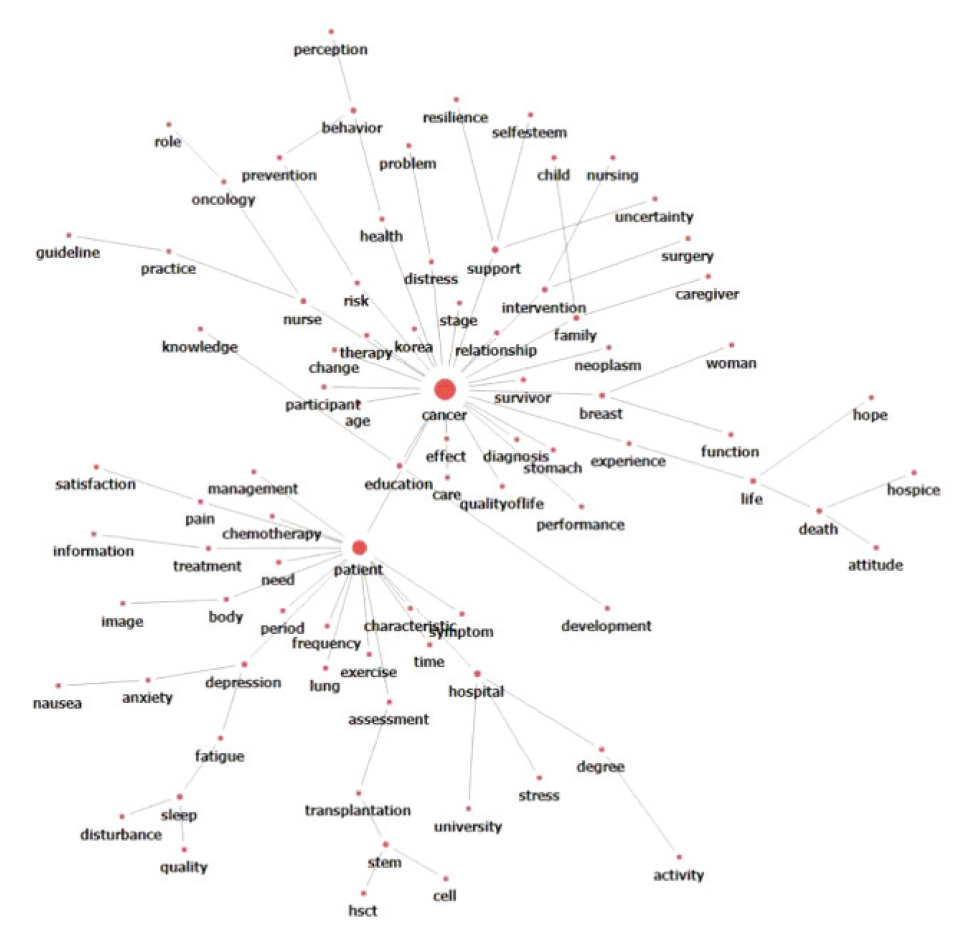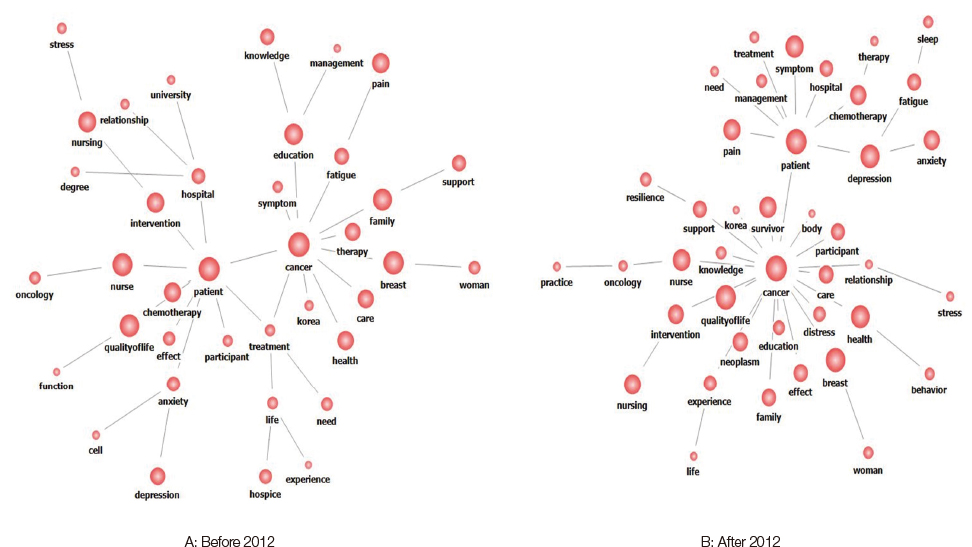Asian Oncol Nurs.
2019 Dec;19(4):193-203. 10.5388/aon.2019.19.4.193.
Text Network Analysis of Oncology Nursing Studies Published in the Journal of Asian Oncology Nursing
- Affiliations
-
- 1Department of Nursing, Kyungbok University, Namyangju, Korea.
- 2Department of Nursing, Gangneung-Wonju National University, Wonju, Korea. jhjeon@gwnu.ac.kr
- 3Department of Nursing, Chung-Ang University, Seoul, Korea.
- KMID: 2467634
- DOI: http://doi.org/10.5388/aon.2019.19.4.193
Abstract
- PURPOSE
The purpose of this study was to identify the knowledge structure of Asian Oncology Nursing (AON) from 2002 to 2018.
METHODS
Abstracts from 382 studies were reviewed and analyzed using the text network analysis program, NetMiner 4.3. Keywords network trends were compared before and after 2012 when the journal title changed from Journal of Korean Oncology Nursing to Journal of Asian Oncology Nursing.
RESULTS
"˜Cancer,'"˜patient,'"˜quality of life,'"˜breast,'"˜nurse,'"˜depression,'"˜health,'"˜nursing,'"˜pain,'"˜family' were the top 10 most frequent keywords, and "˜cancer,'"˜patient,'"˜quality of life,'"˜health,'"˜nursing,'"˜family,'"˜intervention,'"˜effect,'"˜hospital,' and "˜therapy' were the dominant keywords that ranked highest in co-appearance frequency. Core keywords changed before and after 2012. After 2012, depression, health, symptom and pain were the keywords ranked that replaced nursing, education, family, and intervention from before 2012. Four subtopic groups were identified: 1) cancer treatment, education and information, 2) chemotherapy and psychological adjustment, 3) psychosocial adjustment of cancer survivors, and 4) process of cancer intervention and support.
CONCLUSION
This study provides a general overview of research trends of the Asian Oncology Nursing Society. Findings of this study may guide future research directions in Asian Oncology Nursing research.
Keyword
MeSH Terms
Figure
Reference
-
1. Korea Central Cancer Registry, National Cancer Center. Annual report of cancer statistics in Korea in 2015. Sejong: Ministry of Health and Welfare;2017.2. Payne JK. Current trends in oncology nursing. Pittsburgh, PA: Oncology Nursing Society;2012.3. Molassiotis A, Gibson F, Kelly D, Richardson A, Dabbour R, Ahmad AM, et al. A systematic review of worldwide cancer nursing research: 1994 to 2003. Cancer Nurs. 2006; 29:431–440.4. Kim SH, Kim MY, Kim SH, Kim HK, Lee I, Lee J, et al. Trends of studies published in Asian Oncology Nursing, 2011~2014. Asian Oncol Nurs. 2015; 15:114–122.
Article5. Jang KS, Kim BN, Kim YM, Kim JS, Jeong SH. Analysis of research articles published in the Journal of Korean Academy of Nursing Administration for 3 years (2010~2012). J Korean Acad Nurs Adm. 2013; 19:679–688.
Article6. Phillips J, Weekes D. Incorporating multiculturalism into oncology nursing research: the last decade. Oncol Nurs Forum. 2002; 29:807–816.
Article7. Knobf MT, Cooley ME, Duffy S, Doorenbos A, Eaton L, Given B, et al. The 2014–2018 Oncology Nursing Society research agenda. Oncol Nurs Forum. 2015; 42:450–465.
Article8. Maree J, Schmollgruber S. An integrative review of South African cancer nursing research published from 2002–2012. Curationis. 2014; 37:1193.
Article9. Oh PJ. An integrative review of oncology nursing research in Korea: 1998–2003. J Korean Oncol Nurs. 2003; 3:112–121.10. Chung BY, Yi MS, Choi EH. Trends of nursing research in the Journal of Oncology Nursing. J Korean Oncol Nurs. 2008; 8:61–66.11. Jun M, So HS, Choi KS, Chung BY, Ryu E, Lee DS, et al. Analysis of research papers published by three nursing journals to suggest the direction of Journal of Korean Oncology Nursing. J Korean Oncol Nurs. 2011; 11:163–170.
Article12. Oh PJ. An integrative review of oncology nursing research in Korea: 2003–2008. J Korean Oncol Nurs. 2010; 10:80–87.13. Park EJ, Kim Y, Park CS. A comparison of hospice care research topics between Korea and other countries using text network analysis. J Korean Acad Nurs. 2017; 47:600–612.
Article14. Park CS, Jung JW. Text network analysis: sharing meanings among stakeholders of the policy through a socio-cognitive network analysis. J Gov Stud. 2013; 19:75–110.15. Min HS, Kim CY. Exploratory study of publicness in healthcare sector through text network analysis. Health Policy Manag. 2016; 26:51–62.
Article16. He Q. Knowledge discovery through co-word analysis. Libr Trends. 1999; 48:133–159.17. Kim YH, Kim YJ. Social network analysis. Seoul: Parkyoungsa;2016.18. Grundy M, Ghazi F. Research priorities in haemato-oncology nursing: results of a literature review and a Delphi study. Eur J Oncol Nurs. 2009; 13:235–249.
Article19. Maree JE, Herbert V, Huiskamp AA. Cancer nursing research output in Africa 2005 to 2014: an integrative review. Cancer Nurs. 2017; 40:E36–E44.20. Bender CM, Thelen BD. Cancer and cognitive changes: the complexity of the problem. Semin Oncol Nurs. 2013; 29:232–237.
Article21. Skerman HM, Yates PM, Battistutta D. Identification of cancer-related symptom clusters: an empirical comparison of exploratory factor analysis methods. J Pain Symptom Manage. 2012; 44:10–22.
Article22. Aziz NM, Grady PA, Curtis JR. Training and career development in palliative care and end-of-life research: opportunities for development in the U.S. J Pain Symptom Manage. 2013; 46:938–946.
Article23. Jansen CE, Miaskowski C, Dodd M, Dowling G, Kramer J. A metaanalysis of studies of the effects of cancer chemotherapy on various domains of cognitive function. Cancer. 2005; 104:2222–2233.
Article24. Dougan M, Dranoff G. Immune therapy for cancer. Annu Rev Immunol. 2009; 27:83–117.
Article25. Brown JC, Huedo-Medina TB, Pescatello LS, Pescatello SM, Ferrer RA, Johnson BT. Efficacy of exercise interventions in modulating cancerrelated fatigue among adult cancer survivors: a meta-analysis. Cancer Epidemiol Biomarkers Prev. 2011; 20:123–133.
Article26. Wenzel LB, Donnelly JP, Fowler JM, Habbal R, Taylor TH, Aziz N, et al. Resilience, reflection, and residual stress in ovarian cancer survivorship: a gynecologic oncology group study. Psychooncology. 2002; 11:142–153.
Article27. Smith BD, Smith GL, Hurria A, Hortobagyi GN, Buchholz TA. Future of cancer incidence in the United States: burdens upon an aging, changing nation. J Clin Oncol. 2009; 27:2758–2765.
Article28. Van Cleave JH, Kenis C, Sattar S, Jabloo VG, Ayala AP, Puts M. A research agenda for gero-oncology nursing. Semin Oncol Nurs. 2016; 32:55–64.
Article29. Von Ah D, Brown CG, Brown SJ, Bryant AL, Davies M, Dodd M, et al. Research agenda of the oncology nursing society: 2019–2022. Oncol Nurs Forum. 2019; 46:654–669.
Article
- Full Text Links
- Actions
-
Cited
- CITED
-
- Close
- Share
- Similar articles
-
- Corrigendum
- Analysis of Students Experience related of Nursing Management Clinical Practice: Text Network Analysis Method
- Trend Analysis of Theory-based Research Published in Asian Oncology Nursing
- An analysis of Research Published in the Journal of Korean Academy of Psychiatric and Mental Health Nursing from 2013 to 2022 using Text Network Analysis and Topic Modeling
- Text Network Analysis Related to Disclosure of Cancer Diagnosis among Korea and other Countries



